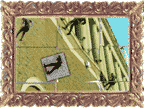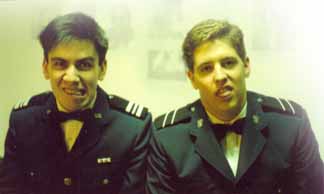|
Dusty Dog Reviews The whole project is hip, anti-academic, the poetry of reluctant grown-ups, picking noses in church. An enjoyable romp! Though also serious. |

|
Nick DiSpoldo, Small Press Review (on Children, Churches and Daddies, April 1997) Children, Churches and Daddies is eclectic, alive and is as contemporary as tomorrow’s news. |
Children, Churches and Daddies
Volume 144, January 22, 2005
The Unreligious, Non-Family-Oriented Literary and Art Magazine
ISSN 1068-5154
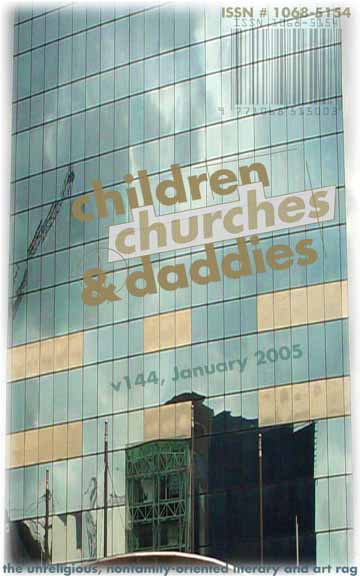
the boss lady’s editorial
We’re in a War: |
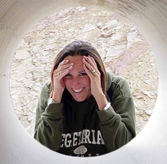
Editor’s photo |
![]()
![]()
An Open Letter from Sam Hamill
New Years Day, 2005Dear Friends:
The war drags on. Fallujah has been destroyed in order to save it, shades of Vietnam. A man who presented the argument in favor of ignoring the Geneva accords, a man who would authorize torture, is now our Attorney General. More than 100,000 Iraqi civilians dead, many times more wounded, homeless... And American soldiers who have served their tours of duty are being post facto drafted to remain in combat.
We can look forward to Bush’s new secretary of state continuing to... who knows what? And there will be supreme and other high court appointments, and of course a Patriot Act II, with attendant incursions into our constitutional rights. Tax cuts for the rich? Permanent. The environment? The worst policies in our history. What a ghastly litany.
Four more years, indeed.
Like kindred organizations in countries around the world, we have reminded millions of people of the noble traditions of poetry, of its role in every culture. I have seen time and again tears of gratitude in the eyes of the Italians, French, Lithuanians, etc, and have received innumerable messages of hope, support and kinship from all over the world. These people are grateful to be reminded that (at least) half of the U.S. objects to the direction this country’s taken, and that we are eager to listen to and work cooperatively with them so that all of our voices (and various positions) may be heard while we stand together.
In the ecology of the soul, thrift is ruinous. We look forward to a productive new year filled with mindful actions, generosity of spirit, heartfelt compassion, and of course a lot of good poetry.
Sam Hamill
poetsagainstthewar.org
![]()
news you can use
NEW YEAR FOR CHOOSING A HEALTH PLAN
by Scott Holleran
![]() For many workers, the new year initiates a process called open enrollment — when many employees designate a health plan through their employer — that’s as comprehensible as the tax code. During the annual cattle call, employees are pummeled with bureaucratic jargon about co-pays, deductibles, and out-of-pocket maximums.
For many workers, the new year initiates a process called open enrollment — when many employees designate a health plan through their employer — that’s as comprehensible as the tax code. During the annual cattle call, employees are pummeled with bureaucratic jargon about co-pays, deductibles, and out-of-pocket maximums.
![]() Though some employers have discovered a relatively simple alternative that’s far superior, open enrollment in a health plan gets more confusing — and, for everyone, more expensive — each year. Understanding why requires a basic grasp of health policy history.
Though some employers have discovered a relatively simple alternative that’s far superior, open enrollment in a health plan gets more confusing — and, for everyone, more expensive — each year. Understanding why requires a basic grasp of health policy history.
![]() The widespread bureaucratization of medicine was developed during the 20th century, when the government began to intervene in the medical profession with a range of regulations. From changing the tax code to punish individuals buying their own health insurance to socialized medicine for those persons over age 65 and an employer mandate to offer something called an HMO, the concept of force is at the core of today's health financing system.
The widespread bureaucratization of medicine was developed during the 20th century, when the government began to intervene in the medical profession with a range of regulations. From changing the tax code to punish individuals buying their own health insurance to socialized medicine for those persons over age 65 and an employer mandate to offer something called an HMO, the concept of force is at the core of today's health financing system.
![]() The individual was first discouraged from buying insurance in 1942 when employee health premiums were made tax deductible to employers — not to individuals. Congress created Medicare in 1965, making individual insurance for those over 65 obsolete. Subsidized, unrestricted health care for seniors lead to a frenzy of spending by patients and doctors.
The individual was first discouraged from buying insurance in 1942 when employee health premiums were made tax deductible to employers — not to individuals. Congress created Medicare in 1965, making individual insurance for those over 65 obsolete. Subsidized, unrestricted health care for seniors lead to a frenzy of spending by patients and doctors.
![]() Predictably, as costs went up, those on the left, including then freshman Sen. Ted Kennedy, insisted that government pay for everyone’s health care; they promoted the idea of a health maintenance organization, a term coined by a left-wing college professor.
Predictably, as costs went up, those on the left, including then freshman Sen. Ted Kennedy, insisted that government pay for everyone’s health care; they promoted the idea of a health maintenance organization, a term coined by a left-wing college professor.
![]() President Nixon appeased the left and proposed the HMO Act, which Congress passed in 1973. The law created new, supposedly cheaper health coverage with millions of dollars to HMOs, which, until then, constituted a small portion of the market. Combined with Medicare, the HMO Act eventually eliminated affordable individual health insurance.
President Nixon appeased the left and proposed the HMO Act, which Congress passed in 1973. The law created new, supposedly cheaper health coverage with millions of dollars to HMOs, which, until then, constituted a small portion of the market. Combined with Medicare, the HMO Act eventually eliminated affordable individual health insurance.
![]() Employers, forced to offer HMOs, stopped offering a choice of plans, making real insurance more expensive for the individual. The government had instituted HMOs — and their cousin, PPOs, which were also instituted by the state — at the insistence of the left and the capitulation of conservatives.
Employers, forced to offer HMOs, stopped offering a choice of plans, making real insurance more expensive for the individual. The government had instituted HMOs — and their cousin, PPOs, which were also instituted by the state — at the insistence of the left and the capitulation of conservatives.
![]() The result was quasi-socialized medicine and, as with every compromise of capitalism and socialism, capitalism was blamed for the resulting disaster. Advocates of socialism, such as Sen. Kennedy, merely became opponents of the monstrous hybrid they had concocted.
The result was quasi-socialized medicine and, as with every compromise of capitalism and socialism, capitalism was blamed for the resulting disaster. Advocates of socialism, such as Sen. Kennedy, merely became opponents of the monstrous hybrid they had concocted.
![]() Since Nixon’s and Kennedy’s HMO Act was passed, the individual has become a prisoner. Covered by an employer and herded into managed care, the individual is powerless. Under managed care, the patient wanders the maze of managed care, awaiting treatment approval, hoping not to be refused or delayed treatment.
Since Nixon’s and Kennedy’s HMO Act was passed, the individual has become a prisoner. Covered by an employer and herded into managed care, the individual is powerless. Under managed care, the patient wanders the maze of managed care, awaiting treatment approval, hoping not to be refused or delayed treatment.
![]() It’s money for practically nothing. Premiums deducted from a paycheck for a managed care plan do not pay for medical treatment decided essentially between patient and doctor, adjudicated by insurance companies using objective standards; premiums pay for the management of care, i.e., health maintenance, by a third party.
It’s money for practically nothing. Premiums deducted from a paycheck for a managed care plan do not pay for medical treatment decided essentially between patient and doctor, adjudicated by insurance companies using objective standards; premiums pay for the management of care, i.e., health maintenance, by a third party.
![]() Unrestricted free choice in medicine — insurance chosen, provided and paid for by the individual — has practically vanished. But a new concept in paying for medicine, the Health Savings Account (HSA), offers the first real opportunity in generations.
Unrestricted free choice in medicine — insurance chosen, provided and paid for by the individual — has practically vanished. But a new concept in paying for medicine, the Health Savings Account (HSA), offers the first real opportunity in generations.
![]() Combined with catastrophic insurance, the Health Savings Account offers a choice to purchase health care as an individual — neither through an employer nor through government. Using money from the HSA, which, unlike a 401(k), the employee owns, the patient can pay out of pocket for health costs or leave the money alone to earn interest.
Combined with catastrophic insurance, the Health Savings Account offers a choice to purchase health care as an individual — neither through an employer nor through government. Using money from the HSA, which, unlike a 401(k), the employee owns, the patient can pay out of pocket for health costs or leave the money alone to earn interest.
![]() Once the HSA-compatible health plan’s deductible is reached, the insurance policy kicks in, typically with free choice of doctors and hospitals, though HSA plans vary. Imagine medicine without networks, percentages, thresholds, co-pays, generics and pre-authorization from a nurse practitioner at a phone bank in Idaho — that’s the best of the Health Savings Account plans: free choice of treatment, 100 percent of costs above the deductible, real, name-brand drugs and less restrictions on medicine, that plus tax-deductible contributions which earn as much as four percent interest.
Once the HSA-compatible health plan’s deductible is reached, the insurance policy kicks in, typically with free choice of doctors and hospitals, though HSA plans vary. Imagine medicine without networks, percentages, thresholds, co-pays, generics and pre-authorization from a nurse practitioner at a phone bank in Idaho — that’s the best of the Health Savings Account plans: free choice of treatment, 100 percent of costs above the deductible, real, name-brand drugs and less restrictions on medicine, that plus tax-deductible contributions which earn as much as four percent interest.
![]() The notion of a tax-advantaged savings account to which the employer and the employee may contribute is a knockout punch to higher health costs for lower quality care. It beats the bureaucratic open HMO/PPO enrollment in which embattled employers bear the burden of higher premiums while their employees suffer under arbitrary restrictions.
The notion of a tax-advantaged savings account to which the employer and the employee may contribute is a knockout punch to higher health costs for lower quality care. It beats the bureaucratic open HMO/PPO enrollment in which embattled employers bear the burden of higher premiums while their employees suffer under arbitrary restrictions.
![]() The lack of a market in individual health insurance, not a lack of regulations, led to today’s open enrollment mess. A better health plan, such as a Health Savings Account policy, preserves the right to choose — and pay for — one’s own health care. It is becoming an option at last and, for many workers and the businesses that employ them, the faster, the better.
The lack of a market in individual health insurance, not a lack of regulations, led to today’s open enrollment mess. A better health plan, such as a Health Savings Account policy, preserves the right to choose — and pay for — one’s own health care. It is becoming an option at last and, for many workers and the businesses that employ them, the faster, the better.
![]()

Fighting the Demons from Within |
America’s Compassion in Iraq Is Self-Destructive
Fighting a compassionate war is immoral; it is costing the lives of American soldiers in Iraq and emboldening our enemies throughout the Islamic world.
By Elan JournoThe horrific suicide bombing in December of a U.S. mess tent near Mosul and the assassination on Jan. 10 of the deputy chief of Baghdad police--the second Iraqi official murdered in five days--are further indications that the war in Iraq is worsening. Things are going badly not because, as some claim, the United States is arrogant and lacking in humility--but because it is self-effacing and compassionate.
The Bush Administration’s war in Iraq embraces compassion instead of the rational goal of victory. Such an immoral approach to war wantonly sacrifices the lives of soldiers and emboldens our enemies throughout the Middle East to mount further attacks against us.
Regardless of whether the Iraqi dictatorship should have been our initial target in the war against totalitarian Islam, when in the nation’s defense a President sends troops to war, morally he must resolve to soundly defeat the enemy while safeguarding our forces and citizens. But America’s attention has been diverted to rebuilding Iraqi hospitals, schools, roads and sewers, and on currying favor with the locals (some U.S. soldiers were even ordered to grow moustaches in token of their respect for Iraqi culture, others are now given cultural sensitivity courses before arriving in Iraq). Since the war began, Islamic militants and Saddam loyalists have carried out random abductions, devastating ambushes, and catastrophic bombings throughout the country. That attacks on U.S. forces (including those engaged in reconstruction efforts) have gone unpunished has emboldened the enemy.
Early and stark evidence of the enemy’s growing audacity came in March 2004 with the grisly murder and mutilation of four American contractors. Following the attack, U.S. forces entered the city of Fallujah vowing to capture the murderers and punish the town that supports them. But such resolve was supplanted by compassion.
In the midst of the fighting the United States called a unilateral ceasefire to allow humanitarian aid in and to enable the other side to collect and bury its dead. The so-called truce benefited only the enemy. The Iraqis, as one soldier told the Associated Press, were “absolutely taking advantage” of the situation, regrouping and mounting sporadic attacks: as another soldier aptly noted, “It is hard to have a cease-fire when they maneuver against us, they fire at us.” As the siege wore on, the goal of capturing the murderers quietly faded--and the enemy’s confidence swelled.
Neither the later offensive on Fallujah in November nor any of the subsequent incursions have quelled the insurgents: witness the unending string of car bombings and (road-side) ambushes. Why?
Because in Fallujah and throughout this war the military (under orders from Washington) has been purposely treading lightly. Soldiers have strict orders to avoid the risk of killing civilians--many of whom aid or are themselves militants--even at the cost of imperiling their own lives. Mosques, which have served as hideouts for terrorists, are kept off the list of allowed targets. Military operations have been timed to avoid alienating Muslim pilgrims on holy days.
There is no shortage of aggressors lusting for American blood, and they grow bolder with each display of American compassion.
Consider the shameful tenderness shown toward the Islamic cleric Moktadr al-Sadr, who aspires to be the dictator of an Iranian-style theocracy in Iraq. An admirer of the 9/11 hijackers, Sadr has amassed an armed militia of 10,000 men (right under the noses of our military), and demanded that Coalition forces leave Iraq. On the run for the murder of another cleric, he took refuge with his militia in the holy city of Najaf, which has been surrounded by U.S. troops. Rather than attacking, however, the United States agreed to negotiate. It is as absurd to negotiate with and trust the word of a villain such as Sadr as it would have been to negotiate with Nazis bent on wiping out Allied forces in World War II. It is shockingly dangerous that the United States allowed a mediator from Iran--part of the “Axis of Evil” and Sadr’s ideological ally--to assist in the negotiations.
In the end Sadr was allowed to walk away along with his armed militia; his agreement to disarm them has--predictably--gone unfulfilled.Ê
For the enemies of America, Iraq is like a laboratory where they are testing our mettle, with mounting ferocity. The negotiations with Sadr; the half-hearted raids on Fallujah; our timid response to daily insurrections throughout Iraq; America’s outrageously deferential treatment of its enemies--all of these instances of moral weakness reinforce the view of bin Laden and his ilk that America will appease those who seek its destruction.
If we continue to confess doubts about our moral right to defend ourselves, it will only be a matter of time before Islamic militants bring suicide-bombings and mass murder (again) to the streets of the United States.
Though Washington may be blinded by the longing to buy the love of Iraqis, our servicemen know all too well that (as one put it): “When you go to fight, it’s time to shoot--not to make friends with people.” In its might and courage our military is unequaled; it is the moral responsibility of Washington to issue battle plans that will properly “shock and awe” the enemy. Eschewing self-interest in the name of compassion is immoral. The result is self-destruction.
Elan Journo is a junior fellow at the Ayn Rand Institute (www.aynrand.org), in Irvine, Calif. The Institute promotes the philosophy of Ayn Rand, author of Atlas Shrugged and The Fountainhead. Send reactions to reaction@aynrand.org.
Copyright © 2005 Ayn Rand® Institute, 2121 Alton Parkway, Suite 250, Irvine, CA 92606. All rights reserved.
![]()
Choice.
Charlie Newman
Wal-Mart will not sell Maxim, Stuff, The Advocate, Out, or CDs with parental warning labels. They see all this, and all similar media, as immoral.
They did sell The Protocols of the Learned Elders of Zion (a vicious anti-Semetic screed) on their web site until it kicked up a very public PR nighhtmare. They continue to sell videotapes of Birth of a Nation (white supremacy trash), as well as books like The Clansman (the book upon which Birth of a Nation is based), The South was Right (which claims that the South was an independent country invaded, captured, and to this day occupied by a vicious aggressor), Myths of American Slavery (which attempts to “defeat the misinterpretations” related to American slavery), Was Jefferson Davis Right? (which is a spirited defense of the man who lead the South), and the like.
It is their right to sell what they want to sell and not sell what they don’t want to sell.
It is your right to support corporations with which you agree by buying their goods or to withhold your monetary support from corporations with which you disagree.
Shop at Wal-Mart? My ass.
![]()

“8” art by Christine Sorich
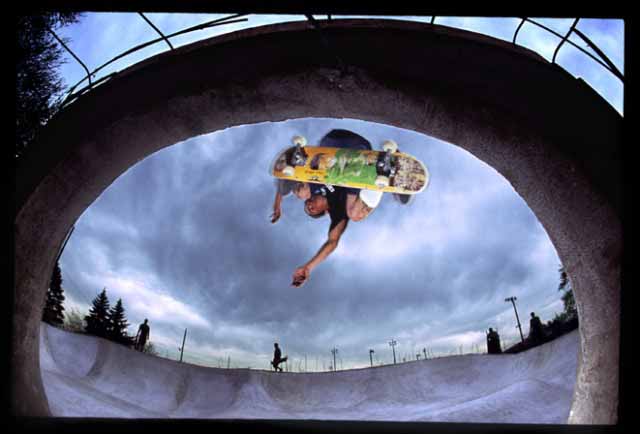
art by Dave Matson
poetry
All That Damns You
Michelle Greenblatt
The sun has been falling all afternoon, then, a current of clouds
lashes it back up, yanking it into the sky.
This reminds me of us,
the ascension, dissention, & dropping down the horizon.
What else, then? Your uncovered feet;
you thought I wouldn’t
peek
while you were dreaming
to see if my nightmare had come true. Stippled with scabs,
thunder tangling around
my eyes as I put my hand to your thigh, trying not
to wake you, trying not to kill you.
My face swollen with unshed tears, I ache now to name
you, first name, middle, last. When you read this,
remember all I have written that damns you. When you
read this, remember all I have written that doesn’t.
![]()
LANGAUAGE VANDALISM POEM (PULL THE RIP CHORD)
Kenneth DiMaggio
![]() Pull the rip chord
Pull the rip chord
from your religion
![]() metaphysical free fall
metaphysical free fall
while the face of God that you saw
in a dream drifts like a failed parachute
until it gets snagged on the TV antenna
and the barbed wire
leaving it exposed
to the radioactive and the chemical
weather that will bleach this dead spirit
![]() until it becomes a rag
until it becomes a rag
good enough only
to tourniquet an artery
passionate for the syringe kiss
of the artificial
![]() Then
Then
will you be able to resuscitate your soul
so that it can be strapped down
and electrically re-charged
and flop around
like an eel
pulled
from a corpse
and thrown onto an elegantly set
dining room table
![]() Maybe that
Maybe that
![]() will put more focus
will put more focus
![]() back into a haunting
back into a haunting
![]() memory
memory
![]() that is frantically coagulating
that is frantically coagulating
like a scrambled TV-screen image
![]() Can you ever get back
Can you ever get back
what was once your true form
![]() after something simple as one word
after something simple as one word
could no longer take root within you?
![]() C d g l and
C d g l and
the way those letters might be arranged
along with a few more might able to tell
![]() But when
But when
did something so easy
as using paper and pen
![]() require
require
so much violence and destruction
![]() when
when
did the suppressed cry
from one so young
become the monster'’s
berserk
![]() but now dying roar
but now dying roar
![]()
LANGUAGE VANDALISM POEM (GET LOST)
Kenneth DiMaggio
![]() Now be a good
Now be a good
![]() little puppet
little puppet
![]() remember
remember
to look charming
![]() but stupid
but stupid
![]() when you go for that interview
when you go for that interview
and give the correct answers like
![]() Democracy is the center of the universe
Democracy is the center of the universe
and all the other countries
that revolve around it are barbarians
![]() Instead
Instead
of going to graduate school
![]() exile
exile
yourself to the asbestos filled warehouse
and a job fok lifting
the liposucted remains
sunctioned from the rotting metaphysics
of a dead religion
that if you could pretend to believe in
![]() would let you become your own
would let you become your own
painted and plastic and seemingly
indepedent mannequinn
![]() Just leave it to your superiors
Just leave it to your superiors
to dress you in the appropriate ideology
![]() So this is what prisons
So this is what prisons
and if necessary wars are for
![]() to make that pissed off
to make that pissed off
tatooed flesh
wish that it was made out of pine
and had nice pretty red circles
on its cheeks
![]() Is that why
Is that why
the writers for sale
![]() at my Barnes & Noble bookstore
at my Barnes & Noble bookstore
![]() all look like the dolls
all look like the dolls
you try to knock down with a ball
at the carnival
![]() but not if you become the author
but not if you become the author
of your own foul disturbed
psychotic and saciligious language
![]() starting with the words: “Get Lost.”
starting with the words: “Get Lost.”
![]() But if you know how to curse
But if you know how to curse
or deface great works of art
![]() you can stay
you can stay
and some of the other
creatures of this planet like monkeys poets
porn stars and crimminals
but no professors police
officers politicians or God
![]()

Chicago, IL, art by Joel McGregor

Blue Tower, art by Nick Brazinski
Korean War Memorial 1995
(for my grandfather)Joseph Veronneau
Souls are reborn
Let’s approach tragedy
Let’s take the back roads
and round-up a grocery
(i wanted pain)
Once I was at a beach
I too have my recorders.
Every year, at the end of the year
When I first went to college
When I looked around me, and saw friends
What did you think I was doing
and I had a lot of work to do.
Did you think your crimes would go unpunished?
you want to know why I do the things I do
I had to record these things
I need to record these things
Like Lemmings All Walk
-- Eric Barnhill
Debra Purdy Kong, writer, British Columbia, Canada
Children, Churches and Daddies.
what is veganism?
why veganism?
so what is vegan action?
A vegan, cruelty-free lifestyle may be the most important step a person can take towards creatin a more just and compassionate society. Contact us for membership information, t-shirt sales or donations.
vegan action
Children, Churches and Daddies no longer distributes free contributor’s copies of issues. In order to receive issues of Children, Churches and Daddies, contact Janet Kuypers at the cc&d e-mail addres. Free electronic subscriptions are available via email. All you need to do is email ccandd@scars.tv... and ask to be added to the free cc+d electronic subscription mailing list. And you can still see issues every month at the Children, Churches and Daddies website, located at http://scars.tv
MIT Vegetarian Support Group (VSG)
functions:
We also have a discussion group for all issues related to vegetarianism, which currently has about 150 members, many of whom are outside the Boston area. The group is focusing more toward outreach and evolving from what it has been in years past. We welcome new members, as well as the opportunity to inform people about the benefits of vegetarianism, to our health, the environment, animal welfare, and a variety of other issues.
Dusty Dog Reviews: These poems document a very complicated internal response to the feminine side of social existence. And as the book proceeds the poems become increasingly psychologically complex and, ultimately, fascinating and genuinely rewarding.
C Ra McGuirt, Editor, The Penny Dreadful Review: CC&D is obviously a labor of love ... I just have to smile when I go through it. (Janet Kuypers) uses her space and her poets to best effect, and the illos attest to her skill as a graphic artist.
Dusty Dog Reviews: She opens with a poem of her own devising, which has that wintry atmosphere demonstrated in the movie version of Boris Pasternak’s Doctor Zhivago. The atmosphere of wintry white and cold, gloriously murderous cold, stark raging cold, numbing and brutalizing cold, appears almost as a character who announces to his audience, “Wisdom occurs only after a laboriously magnificent disappointment.& #148; Alas, that our Dusty Dog for mat cannot do justice to Ms. Kuypers’ very personal layering of her poem across the page.
Fithian Press, Santa Barbara, CA
Mark Blickley, writer
You Have to be Published to be Appreciated.
Do you want to be heard? Contact Children, Churches and Daddies about book or chapbook publishing. These reviews can be yours. Scars Publications, attention J. Kuypers. We’re only an e-mail away. Write to us.
The Center for Renewable Energy and Sustainable Technology
Dorrance Publishing Co., Pittsburgh, PA
want a review like this? contact scars about getting your own book published.
The magazine Children Churches and Daddies is Copyright ©
through
Scars Publications and Design. The rights of the individual pieces remain with the authors. No material may be reprinted without express permission from the author.
Okay, nilla wafer. Listen up and listen good. How to save your life. Submit, or I’ll have to kill you.
Okay, butt-munch. Tough guy. This is how to win the editors over.
Carlton Press, New York, NY: HOPE CHEST IN THE ATTIC is a collection of well-fashioned, often elegant poems and short prose that deals in many instances, with the most mysterious and awesome of human experiences: love... Janet Kuypers draws from a vast range of experiences and transforms thoughts into lyrical and succinct verse... Recommended as poetic fare that will titillate the palate in its imagery and imaginative creations.
You Have to be Published to be Appreciated.
Dorrance Publishing Co., Pittsburgh, PA: “Hope Chest in the Attic& #148; captures the complexity of human nature and reveals startling yet profound discernments about the travesties that surge through the course of life. This collection of poetry, prose and artwork reflects sensitivity toward feminist issues concerning abuse, sexism and equality. It also probes the emotional torrent that people may experience as a reaction to the delicate topics of death, love and family. “Chain Smoking& #148; depicts the emotional distress that afflicted a friend while he struggled to clarify his sexual ambiguity. Not only does this thought-provoking profile address the plight that homosexuals face in a homophobic society, it also characterizes the essence of friendship. “The room of the rape& #148; is a passionate representation of the suffering rape victims experience. Vivid descriptions, rich symbolism, and candid expressions paint a shocking portrait of victory over the gripping fear that consumes the soul after a painful exploitation.
Dusty Dog Reviews (on Without You): She open with a poem of her own devising, which has that wintry atmosphere demonstrated in the movie version of Boris Pasternak’s Doctor Zhivago. The atmosphere of wintry white and cold, gloriously murderous cold, stark raging cold, numbing and brutalizing cold, appears almost as a character who announces to his audience, “Wisdom occurs only after a laboriously magnificent disappointment.& #148; Alas, that our Dusty Dog for mat cannot do justice to Ms. Kuypers’ very personal layering of her poem across the page.
Debra Purdy Kong, writer, British Columbia, Canada (on Children, Churches and Daddies): I like the magazine a lot. I like the spacious lay-out and the different coloured pages and the variety of writer’s styles. Too many literary magazines read as if everyone graduated from the same course. We need to collect more voices like these and send them everywhere.
ccandd96@scars.tv
Publishers/Designers Of
Sponsors Of
thought to have once been abandoned completely.
Bottled water was handed out
in humid, inhumane temperatures,
but the politicians still wore suits,
climbed to their respective podium
and delivered speeches
they felt the people wanted to hear.
The grassy terrace held too many
in one place at one time,
looking to put peace on a day
in honor of a war
these politicians had no clue about.
to respect sacrifices that many
unwillingly took.
The men in suits
wanted it to be a revival,
a ballgame, with the crowd roaring
and applauding to stand proud
before television cameras,
awaiting to catch tears down the faces
for ratings.
a picnic, or even a town hall meeting,
this was for lives:
husbands and fathers
moving in military rhythm,
receiving bronze badges of courage
and purple hearts,
when the real courage could have come
from the ones who run the nation.![]()
![]()
The Modern Condition
Joseph Veronneau
like a screaming infant,
with no sense of
who we are
and covet it like a bible.
and turn them into
drug dens
so all dumbfounded poets
can rent the space
and shoot more dope
into their sunglass-tainted eyes;
content to watch MTV
all day long,
Satisfied to pick the
perpetual wedgies
in desert heat.
Gather your words,
I’ll gather mine
and we’ll recite them
in our heads
when days have grown
too short,
or two
at the basement of
our lives.![]()
![]()
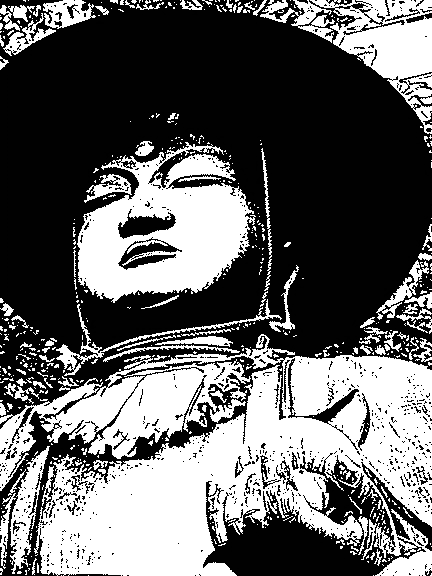
art by Louis Faber
![]()
![]()

art by Nicole Aimiee Macaluso
![]()
![]()
Low Tide
Ryan McElroy
On the news today they’re talking about bodies
the body politic, the politics
of governing bodies- governing
our bodies, ungovernable
by turns torpid
and turgid as bodies
of water
![]()
![]()
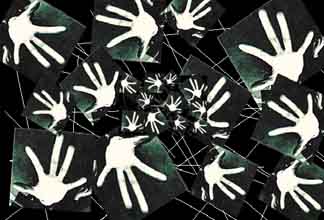
The Hands of Saint Peter, art by Mark Graham
![]()
![]()
(UNTITLED)
Ryan McElroy
a girl is a delicate thing
despite her sunburn and sore back
her stained hands, her bruises
despite what she says
a girl is a delicate thing
she can only break from the inside out
![]()
![]()

art by Xanadu
![]()
![]()
PALL MALLS
Ryan McElroy
You’re killing me slow like cigarettes.
when eleven meets twelve and you’re not near-
your catholic past and your blue period;
these things between us
big lies and small promises-
I want to accept it all,
to accept all of you
bad.
I’m killing me slow like cigarettes.
![]()
![]()

from Heroines Unlikely, art by Stephen Mead
![]()
![]()
Ik verlangde naar pijn
Je schreeuwde naar mij aan de kant te gaan.
Je wou dat ik stopte.
Ik reed te hard, zei je,
daarom stampte ik op de remmen
en zette de motor af.
Ik wou uit de auto springen
en weglopen,
lopen tot ik mezelf verloor.
Ja ik wou vallen.
Ik wou op de grond vallen
Ik wou de kille scherpe grint voelen
die in mijn gezicht sneden
en mijn kin openhaalde.
Ik wou pijn om me weer goed te voelen.
Maar jij zat nog in je auto,
klaar om te racen
mijn geest aan te porren,
tot waanzinnigheid , boven alle grenzen heen.
Ik stond geleund tegen mijn auto,
voelde mijn verzwakte adem
mijn krullen vlogen door de wind tegen mijn gelaat
Ik moest me concentreren op mijn adem
de uitdaging in jou macht te geraken negeren
zolang ik ademen en denken kon.
translated by Jean Hellemans![]()
![]()
Burn It In
copyright © 2004 Janet Kuypers
off the west coast of Florida
it was New Year’s eve
and the yellow moon hung over the gulf
like a swaying lantern.
And I was watching the waves crash in front of me
with a friend
and the wind picked up
and my friend just stared at that moon for a while
and then closed his eyes.
I asked him what he was thinking.
He said, “I wanted to look at this scene,
and memorize it, burn it into my brain,
record it in my mind, so I can call it up when I want to.
So I can have it with me always.”
I burn these things into my brain,
I burn these things onto pages.
I pick and choose what needs to be said,
what needs to be remembered.
I used to write in a journal
recall the things that happened to me
log in all of the memories I needed to keep
because that was what kept me sane
that was what kept me alive.
I was studying to be a computer science
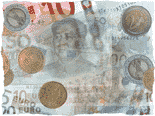 engineer, I wanted to make a lot of money
engineer, I wanted to make a lot of money
I wanted to beat everyone else
because burned in my brain were the taunts
of kids who were in cliques
so others could do the thinking for them
because burned in my brain were the evenings
of the high school dances I never went to
because burned in my brain were the people
I knew I was better than
who thought they were better than me.
Well, yes, I wanted to make a lot of money
I wanted to beat everyone else
but I hated what I was doing
I hated what I saw around me
hated all the pain people put each other through
and all of these memories just kept flooding me
so in my spare time
to keep me sane, to keep me alive
I wrote down the things I could not say
that was how I recorded things.
raping my friends
I wrote, I burned into these nightmares with a pen
and yes, I have this recorded
I have all of this recorded.
when I was stuffing hand-written notes into my pockets
or typing long hours into the night?
In college, I had two roommates
who in their spare time would watch movies in our living room
and cross-stitch. I never understood this.
In my spare time, I was not watching other’s stories
or weaving thread to keep my hands busy
I was sitting in the corner of a cafe
scribbling into my notebook.
I was sitting in the university computer lab
slamming my hands, my fingers against the keyboard
because there were too many atrocities in the world
too many injustices that I had witnessed
too many people who had wronged me
There had to be a record of what you’ve done.
And did you think that you could come back, years later,
slap me on the back with a friendly hello
and think I wouldn’t remember?
You see, that’s what I have my poems for
so there will always be a record
of what you have done
I have defiled many pages
in your honor, you who swung
your battle ax high above your head
and thought no one would remember in the end.
Well, I made a point to remember.
Yes, I have defiled many pages
and have you defiled many women?
You, the man who rapes my friends?
You, the man who rapes my sisters?
You, the man who rapes me?
Is this what makes you a strong man?
that is what kept me together
when people were dying
that is what kept me together
when my friends went off to war
that is what kept me together
when my friends were raped
and left for dead
that is what kept me together
when no one bothered to
notice this
or change this
or care about this
these recordings kept me together
to remind myself
of where I came from
I need to record these things
to remind myself
that there are things to value
and things to hate
I need to record these things
to remind myself
that there are things worth fighting for
worth dying for
I need to record these things
to remind myself
that I am alive![]()
![]()

Naked Girl, art by Rose E. Grier
![]()
![]()
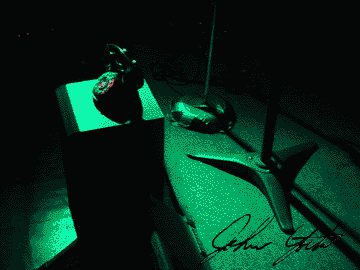
Not Mute Phone, art by John Yotko
![]()
![]()
(c) 2005 Frank Anthony
![]() And Drown Together
And Drown Together
Dreaming of evacuation
has to do with process
is this history of one
who is wholly careless
Discharge its contents
with emptying a weapon
until a people relents
uses everyone as a pawn
See him walking softly
carrying the big stick
containing our energy
Sit war out is a trick
sick political synergy![]()
![]()

Bubble Girl, art by Cheryl Townsend
![]()
![]()
Philosophy Monthly
The Irrelevance of the Avant-Garde
![]() In the normal course of events, the world is content to ignore the capers that take place in our ivory-tower institutions. But in response to the terrorist attacks of September 11, the public has suddenly cast a sharp eye on obscure academic figures whose reactions demonstrate either an appalling callousness, an extreme removal from reality, or both. One figure in the latter category is Karlheinz Stockhausen, a German composer considered a modern master among contemporary academic composers--and ignored by the rest of the world.
In the normal course of events, the world is content to ignore the capers that take place in our ivory-tower institutions. But in response to the terrorist attacks of September 11, the public has suddenly cast a sharp eye on obscure academic figures whose reactions demonstrate either an appalling callousness, an extreme removal from reality, or both. One figure in the latter category is Karlheinz Stockhausen, a German composer considered a modern master among contemporary academic composers--and ignored by the rest of the world.
![]() The Frankfurter Allgemeinische Zeitung’s English edition carries the following account of Stockhausen’s comments, by reporter Julia Spinola:
The Frankfurter Allgemeinische Zeitung’s English edition carries the following account of Stockhausen’s comments, by reporter Julia Spinola:
![]() Asked at a press conference on Monday for his view of the events, Stockhausen answered that the attacks were “the greatest work of art imaginable for the whole cosmos. . . . Minds achieving something in an act that we couldn’t even dream of in music, people rehearsing like mad for ten years, preparing fanatically for a concert, and then dying, just imagine what happened there. You have people who are that focused on a performance and then five thousand people are dispatched into the afterlife, in a single moment. I couldn’t do that. By comparison, we composers are nothing.”
Asked at a press conference on Monday for his view of the events, Stockhausen answered that the attacks were “the greatest work of art imaginable for the whole cosmos. . . . Minds achieving something in an act that we couldn’t even dream of in music, people rehearsing like mad for ten years, preparing fanatically for a concert, and then dying, just imagine what happened there. You have people who are that focused on a performance and then five thousand people are dispatched into the afterlife, in a single moment. I couldn’t do that. By comparison, we composers are nothing.”
![]() His later explanation was: “At the press conference in Hamburg, I was asked if Michael, Eve, and Lucifer were historical figures of the past and I answered that they exist now, for example Lucifer in New York. . . . I said that [the events] appeared to be Lucifer’s greatest work of art. . . . I cannot find a fitting name for such a ‘satanic composition.’”
His later explanation was: “At the press conference in Hamburg, I was asked if Michael, Eve, and Lucifer were historical figures of the past and I answered that they exist now, for example Lucifer in New York. . . . I said that [the events] appeared to be Lucifer’s greatest work of art. . . . I cannot find a fitting name for such a ‘satanic composition.’”
![]() For those who are wondering how classical music came to this, we can look first to Arnold Schoenberg, the early twentieth-century composer who argued that our traditional harmonic system, cultivated over centuries and producing many of our civilization’s greatest treasures, had run its course and an entirely new organizing principle was needed. (He offered his own as the answer.) Schoenberg’s creed was augmented by the French composer Pierre Boulez, who argued that, having done away with traditional harmony, it made no sense to retain traditional melodic or formal structures either.
For those who are wondering how classical music came to this, we can look first to Arnold Schoenberg, the early twentieth-century composer who argued that our traditional harmonic system, cultivated over centuries and producing many of our civilization’s greatest treasures, had run its course and an entirely new organizing principle was needed. (He offered his own as the answer.) Schoenberg’s creed was augmented by the French composer Pierre Boulez, who argued that, having done away with traditional harmony, it made no sense to retain traditional melodic or formal structures either.
![]() Many of our finest composers dissented quietly, went their own ways, and produced beautiful bodies of work. But the Schoenberg-Boulez line was held up as historically inevitable progress, and suddenly composers who wanted to be hip and part of history were left scrambling for their own ‘new’ way of writing music. From the screeching bleeps of Penderecki’s “Threnody for the Victims of Hiroshima” to Cage’s “4’33” (where the pianist shuts the piano and lets the audience’s incidental noise make the “music”), piece after piece emerged that showed little craft and achieved validation only through attaching itself to some artistically “progressive” or politically correct concept.
Many of our finest composers dissented quietly, went their own ways, and produced beautiful bodies of work. But the Schoenberg-Boulez line was held up as historically inevitable progress, and suddenly composers who wanted to be hip and part of history were left scrambling for their own ‘new’ way of writing music. From the screeching bleeps of Penderecki’s “Threnody for the Victims of Hiroshima” to Cage’s “4’33” (where the pianist shuts the piano and lets the audience’s incidental noise make the “music”), piece after piece emerged that showed little craft and achieved validation only through attaching itself to some artistically “progressive” or politically correct concept.
![]() Here is where Stockhausen earned his fame and even became hip enough to end up on the cover of the Beatles’ “Sgt. Pepper” album. He contributed heavily to the avant-garde scene with pieces (among countless others) in which the performer simply lets his eye rove among various isolated chunks of score and plays what he sees for a fixed amount of time--plus loads of ‘experimental electronic’ music that at the time was hailed for being spooky and futuristic but now could be outdone by any teenager with a computer and a sampler. In the end, we had the spectacle in the 1970s of an “avant-garde” music circle that simply dragged to a halt and remains there today, frozen in time, a purgatory in which Stockhausen himself is stuck, while classical composition on the whole has taken a dramatic turn toward conservatism, accessibility, and meaning. Flailing for attention, the avant-gardists produce works that are designed to “send vibrations of welcome to extraterrestrial beings from different galaxies and universes,” according to critic Paul Moor, and a string quartet for four helicopters.
Here is where Stockhausen earned his fame and even became hip enough to end up on the cover of the Beatles’ “Sgt. Pepper” album. He contributed heavily to the avant-garde scene with pieces (among countless others) in which the performer simply lets his eye rove among various isolated chunks of score and plays what he sees for a fixed amount of time--plus loads of ‘experimental electronic’ music that at the time was hailed for being spooky and futuristic but now could be outdone by any teenager with a computer and a sampler. In the end, we had the spectacle in the 1970s of an “avant-garde” music circle that simply dragged to a halt and remains there today, frozen in time, a purgatory in which Stockhausen himself is stuck, while classical composition on the whole has taken a dramatic turn toward conservatism, accessibility, and meaning. Flailing for attention, the avant-gardists produce works that are designed to “send vibrations of welcome to extraterrestrial beings from different galaxies and universes,” according to critic Paul Moor, and a string quartet for four helicopters.
![]() So, it’s hard to see how any of these ivory-tower composers are capable of contributing meaningfully to our experience of the post-September 11 world. The Hungarian composer Gyorgy Ligeti said, in response to Stockhausen’s comments, that he should be confined to a mental institution. But can anyone who knows Ligeti’s music think a work in his style could produce something that speaks to this tragedy? Consequently, like economists’ models that ignore how living people act, their music does none of the things that we look to music to do.
So, it’s hard to see how any of these ivory-tower composers are capable of contributing meaningfully to our experience of the post-September 11 world. The Hungarian composer Gyorgy Ligeti said, in response to Stockhausen’s comments, that he should be confined to a mental institution. But can anyone who knows Ligeti’s music think a work in his style could produce something that speaks to this tragedy? Consequently, like economists’ models that ignore how living people act, their music does none of the things that we look to music to do.
A graduate of New York’s Julliard School, Eric Barnhill is a pianist who has performed in concert halls throughout the United States, Canada, and Europe, as well as at TOC’s 2000 summer seminar![]()
![]()

One piece in this issue is “Crazy,& #148; an interview Kuypers conducted with “Madeline,& #148; a murderess who was found insane, and is confined to West Virginia’s Arronsville Correctional Center. Madeline, whose elevator definitely doesn’t go to the top, killed her boyfriend during sex with an ice pick and a chef’s knife, far surpassing the butchery of Elena Bobbitt. Madeline, herself covered with blood, sat beside her lover’s remains for three days, talking to herself, and that is how the police found her. For effect, Kuypers publishes Madeline’s monologue in different-sized type, and the result is something between a sense of Dali’s surrealism and Kafka-like craziness.
I like the magazine a lot. I like the spacious lay-out and the different coloured pages and the variety of writer’s styles. Too many literary magazines read as if everyone graduated from the same course. We need to collect more voices like these and send them everywhere.
As for the fiction, the piece by Anderson is quite perceptive: I liked the way the self-deluding situation of the character is gradually, subtly revealed. (Kuypers’) story is good too: the way it switches narrative perspective via the letter device is a nice touch.
It speaks for itself.
Write to Scars Publications to submit poetry, prose and artwork to Children, Churches and Daddies literary magazine, or to inquire about having your own chapbook, and maybe a few reviews like these.
A vegan (VEE-gun) is someone who does not consume any animal products. While vegetarians avoid flesh foods, vegans don’t consume dairy or egg products, as well as animal products in clothing and other sources.
This cruelty-free lifestyle provides many benefits, to animals, the environment and to ourselves. The meat and dairy industry abuses billions of animals. Animal agriculture takes an enormous toll on the land. Consumtion of animal products has been linked to heart disease, colon and breast cancer, osteoporosis, diabetes and a host of other conditions.
We can succeed in shifting agriculture away from factory farming, saving millions, or even billions of chickens, cows, pigs, sheep turkeys and other animals from cruelty.
We can free up land to restore to wilderness, pollute less water and air, reduce topsoil reosion, and prevent desertification.
We can improve the health and happiness of millions by preventing numerous occurrences od breast and prostate cancer, osteoporosis, and heart attacks, among other major health problems.
po box 4353, berkeley, ca 94707-0353
510/704-4444
I really like (“Writing Your Name& #148;). It’s one of those kind of things where your eye isn’t exactly pulled along, but falls effortlessly down the poem.
I liked “knowledge& #148; for its mix of disgust and acceptance. Janet Kuypers does good little movies, by which I mean her stuff provokes moving imagery for me. Color, no dialogue; the voice of the poem is the narrator over the film.
* To show the MIT Food Service that there is a large community of vegetarians at MIT (and other health-conscious people) whom they are alienating with current menus, and to give positive suggestions for change.
* To exchange recipes and names of Boston area veg restaurants
* To provide a resource to people seeking communal vegetarian cooking
* To provide an option for vegetarian freshmen
Some excellent writing in “Hope Chest in the Attic.& #148; I thought “Children, Churches and Daddies& #148; and “The Room of the Rape& #148; were particularly powerful pieces.
Indeed, there’s a healthy balance here between wit and dark vision, romance and reality, just as there’s a good balance between words and graphics. The work shows brave self-exploration, and serves as a reminder of mortality and the fragile beauty of friendship.
The precursor to the magazine title (Children, Churches and Daddies) is very moving. “Scars& #148; is also an excellent prose poem. I never really thought about scars as being a form of nostalgia. But in the poem it also represents courage and warmth. I look forward to finishing her book.
The Solar Energy Research & Education Foundation (SEREF), a non-profit organization based in Washington, D.C., established on Earth Day 1993 the Center for Renewable Energy and Sustainable Technology (CREST) as its central project. CREST’s three principal projects are to provide:
* on-site training and education workshops on the sustainable development interconnections of energy, economics and environment;
* on-line distance learning/training resources on CREST’s SOLSTICE computer, available from 144 countries through email and the Internet;
* on-disc training and educational resources through the use of interactive multimedia applications on CD-ROM computer discs - showcasing current achievements and future opportunities in sustainable energy development.
The CREST staff also does “on the road& #148; presentations, demonstrations, and workshops showcasing its activities and available resources.
For More Information Please Contact: Deborah Anderson
dja@crest.org or (202) 289-0061
“Hope Chest in the Attic& #148; captures the complexity of human nature and reveals startling yet profound discernments about the travesties that surge through the course of life. This collection of poetry, prose and artwork reflects sensitivity toward feminist issues concerning abuse, sexism and equality. It also probes the emotional torrent that people may experience as a reaction to the delicate topics of death, love and family.
“Chain Smoking& #148; depicts the emotional distress that afflicted a friend while he struggled to clarify his sexual ambiguity. Not only does this thought-provoking profile address the plight that homosexuals face in a homophobic society, it also characterizes the essence of friendship. “The room of the rape& #148; is a passionate representation of the suffering rape victims experience. Vivid descriptions, rich symbolism, and candid expressions paint a shocking portrait of victory over the gripping fear that consumes the soul after a painful exploitation.
![]()


Okay, it’s this simple: send me published or unpublished poetry, prose or art work (do not send originals), along with a bio, to us - then sit around and wait... Pretty soon you’ll hear from the happy people at cc&d that says (a) Your work sucks, or (b) This is fancy crap, and we’re gonna print it. It’s that simple!
Hope Chest in the Attic is a 200 page, perfect-bound book of 13 years of poetry, prose and art by Janet Kuypers. It’s a really classy thing, if you know what I mean. We also have a few extra sopies of the 1999 book “Rinse and Repeat& #148;, the 2001 book “Survive and Thrive& #148;, the 2001 books “Torture and Triumph& #148; and “(no so) Warm and Fuzzy& #148;,
which all have issues of cc&d crammed into one book. And you can have either one of these things at just five bucks a pop if you just contact us and tell us you saw this ad space. It’s an offer you can’t refuse...
Mark Blickley, writer: The precursor to the magazine title (Children, Churches and Daddies) is very moving. “Scars& #148; is also an excellent prose poem. I never really thought about scars as being a form of nostalgia. But in the poem it also represents courage and warmth. I look forward to finishing the book.
Do you want to be heard? Contact Children, Churches and Daddies about book and chapbook publishing. These reviews can be yours. Scars Publications, attention J. Kuypers - you can write for yourself or you can write for an audience. It’s your call...
Children, Churches and Daddies. It speaks for itself.
Fithian Press, Santa Barbara, CA: Indeed, there’s a healthy balance here between wit and dark vision, romance and reality, just as there’s a good balance between words and graphics. The work shows brave self-exploration, and serves as a reminder of mortality and the fragile beauty of friendship.
the unreligious, non-family oriented literary and art magazine
Scars Publications and Design
http://scars.tv
Children, Churches and Daddies magazine
cc+d Ezines
The Burning mini poem books
God Eyes mini poem books
The Poetry Wall Calendar
The Poetry Box
The Poetry Sampler
Mom’s Favorite Vase Newsletters
Reverberate Music Magazine
Down In The Dirt magazine
Freedom and Strength Press forum
plus assorted chapbooks and books
music, poery compact discs
live performances of songs and readings
past editions:
Poetry Chapbook Contest, Poetry Book Contest
Prose Chapbook Contest, Prose Book Contest
Poetry Calendar Contest
current editions:
Editor’s Choice Award (writing and web sites)
Collection Volumes![]() Children, Churches and Daddies (founded 1993) has been written and researched by political groups and writers from the United States, Canada, England, India, Italy, Malta, Belgium, Norway, Turkey, Israel, Australia and Russia. Regular features provide coverage of environmental, political and social issues (via news and philosophy) as well as fiction and poetry, and act as an information and education source. Children, Churches and Daddies is the leading magazine for this combination of information, education and entertainment.
Children, Churches and Daddies (founded 1993) has been written and researched by political groups and writers from the United States, Canada, England, India, Italy, Malta, Belgium, Norway, Turkey, Israel, Australia and Russia. Regular features provide coverage of environmental, political and social issues (via news and philosophy) as well as fiction and poetry, and act as an information and education source. Children, Churches and Daddies is the leading magazine for this combination of information, education and entertainment.
![]() Children, Churches and Daddies (ISSN 1068-5154) is published quarterly by Scars Publcations and Design. Contact us via e-mail (ccandd96@scars.tv) for subscription rates or prices for annual collection books.
Children, Churches and Daddies (ISSN 1068-5154) is published quarterly by Scars Publcations and Design. Contact us via e-mail (ccandd96@scars.tv) for subscription rates or prices for annual collection books.
![]() To contributors: No racist, sexist or blatantly homophobic material. No originals; if mailed, include SASE & bio. Work sent on disks or through e-mail preferred. Previously published work accepted. Authors always retain rights to their own work. All magazine rights reserved. Reproduction of Children, Churches and Daddies without publisher permission is forbidden.
Children, Churches and Daddies copyright
through
Scars Publications and Design, Children, Churches and Daddies, Janet Kuypers. All rights remain with the authors of the individual
pieces. No material may be reprinted without express permission.
To contributors: No racist, sexist or blatantly homophobic material. No originals; if mailed, include SASE & bio. Work sent on disks or through e-mail preferred. Previously published work accepted. Authors always retain rights to their own work. All magazine rights reserved. Reproduction of Children, Churches and Daddies without publisher permission is forbidden.
Children, Churches and Daddies copyright
through
Scars Publications and Design, Children, Churches and Daddies, Janet Kuypers. All rights remain with the authors of the individual
pieces. No material may be reprinted without express permission.

